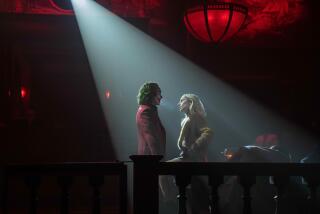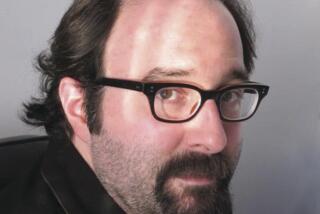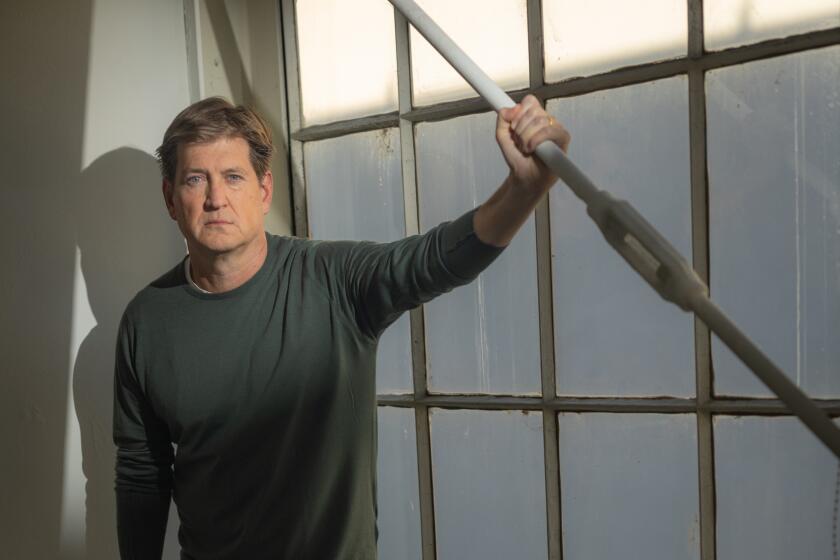As Usual, Hollywood Is Slow to Focus
In the past couple of weeks I’ve been getting calls and e-mails from journalists working on Sept. 11 anniversary pieces, all asking the same question: Has our pop culture changed since last fall’s terrorist attacks? (That answer is easy: no.) It’s the follow-up question--why not?--that can’t be answered quite so easily.
Finally, I came up with an answer that isn’t as glib as it might first appear. I started telling people to watch the MTV Video Music Awards, which have been endlessly replayed over the past 10 days. If you want to understand what award presenter David Lee Roth described as “the front bumper of American pop culture,” the MTV awards are the place to start.
Like so much of today’s pop culture, the awards are relentlessly self-referential and disposably hip, from the fashion and the music to the videos themselves. I doubt that anyone can remember who won best rap video this year, much less last September. The show lives in the moment, which is why it’s such a good cultural barometer.
If the MTV awards have a message, it’s that our pop culture is anything but monolithic. More than ever before, thanks to our omnivorous media outlets, we have a bipolar pop culture; it is idealistic and cynical, hip and square, serious and trivial, new-fashioned and nostalgic, all at the same time. The MTV awards certainly ran the gamut from sublime to ridiculous and back again, from Bruce Springsteen’s inspiring rendition of “The Rising” to Eminem’s bratty petulance to a mournful appearance by the two surviving members of TLC to Sheryl Crow’s somber “Safe and Sound” to Michael Jackson’s wacky acceptance of a nonexistent “artist of the millennium” award to Shakira, who shook her booty in an outfit that looked like it had last been worn by Raquel Welch in “One Million Years B.C.”
The show went on almost as long as the Academy Awards, but unlike the Oscars, which represent black-tie sobriety, the MTV awards are as giddy as a kid with a helium balloon, capturing what is most silly and unpredictable--and thus most real--about our culture. One of the dangers in writing about pop culture, especially in the wake of a seismic event like Sept. 11, is the temptation to make sweeping generalizations about the culture and where it’s going. Vanity Fair’s Graydon Carter is still being ribbed for loftily predicting the death of irony, and I’m hardly one to talk, having written a column last September foolishly forecasting that the terrorist attacks “may have brought to a close a decade of enormous frivolity and escapism.”
We were all as wrong as weathermen are about the weather, probably because we were speaking from our hearts, not with our heads. Things haven’t changed that much in Hollywood because of the nature of our pop culture and of the way the movie industry works. In hindsight we should have known that.
Sept. 11 will always be a signal event in this country’s history, like Pearl Harbor or the Kennedy assassination, but in all honesty, it didn’t change the entertainment industry any more than it changed the automobile business. People got on with their lives. Vanity Fair went back to air-kissing Tom Cruise and other celebrities. Cable news moved on to shark attacks and child abductions.
In Hollywood, everything was basically back to normal within a month of the attacks. In early October, moviegoers turned up in droves for “Training Day,” even though it presented a disturbing vision of police corruption at a time when cops and firemen were being lionized as gung-ho heroes. That doesn’t mean we don’t want to see good cops too--how would network TV survive without ‘em? It’s simply another example of our bipolar culture: We find gangsters and thugs just as compelling as any saints or heroes.
The MTV awards are also a bracing reminder that in a messy democracy like America, our culture is full of contradictions. It doesn’t travel in one straight line, it lunges left and right, forward and backward.
MTV isn’t the only place where Michael Jackson and Rudy Giuliani are on the same stage. I flipped over to NBC the other day and found Sen. Fred Thompson (R-Tenn.) gravely discussing momentous world events on “Meet the Press,” full well knowing he’ll pop up on TV later in the year, this time as an actor, putting crooks away on “Law & Order.”
Pop culture is America’s ultimate melting pot. Turn on Top 40 radio and you can hear everything from steamy funk like Nelly’s “Hot in Here” to cloying pap like Kelly Osbourne’s “Papa Don’t Preach.” On TV, you can find hit shows with the cerebral elegance of “The West Wing” or the kitschy corn of “American Idol.” The movie industry’s current box-office chart has just as much reach, with the ultra-old-fashioned “My Big Fat Greek Wedding” attracting as many moviegoers as the ultra-hip “XXX.”
What the movies don’t do is make films about touchy topical subjects, which is why there are virtually no Sept. 11 projects in the works at major studios. A big part of this is simply demographic: Hollywood is in the youth culture business. Its mandate is to provide its teen fan base with comic-book heroes and escapist comedies.
Still, many people find it perplexing that Hollywood has taken such a hands-off attitude toward Sept. 11 when the news media has covered the story so extensively. The truth is that the news media’s often obsessive coverage has in itself discouraged filmmakers from pursuing the topic.
“Frankly, what story could you possibly tell that hasn’t been on Larry King?” asks Danny Goldberg, head of Artemis Records, which will soon release a Steve Earle CD that includes a controversial ballad about John Walker Lindh, the jailed American Taliban. “Pop culture rarely mirrors what’s just been in the news. You go to the movies to get away from what’s in the news.”
But it’s also fair to say that Hollywood has largely divorced itself from the nitty-gritty of today’s pop culture. Like MTV, the studio films are intensely youth oriented, but unlike MTV, the movies strip away most of the culture’s rough edges.
Most studios are scared by scripts that are too edgy or original, so they buy a lowbrow comedy or a predictable thriller--and then hire an ultra-smart screenwriter to do a rewrite that gives it a hip sheen.
It’s no wonder Hollywood has become such a lumbering, top-down business--everything has to get retouched and enhanced before it can finally go before the cameras.
At some studios, even though a year has past, they’re still debating how to deal with Sept. 11. In pop music, the topic is already old hat--everyone from Bruce Springsteen to Neil Young to Toby Keith has penned Sept. 11-related songs. Musicians can react almost as fast as CNN--they don’t need a studio greenlight to get a topical song on the radio. Ditto for network TV: “The Practice” had an episode earlier this year about a woman whose husband was detained in Guantanamo Bay as a suspected terrorist.
The movie business moves at a glacial pace. Disney, for example, has been working on a new version of “The Alamo” for years. The script was languishing when, in the days following Sept. 11, Disney chief Michael Eisner seized on the idea that American audiences would embrace “The Alamo’s” stirring last-stand heroics. The project was kicked into high gear, but nearly a year later, the movie is still unmade, slowed by a series of rewrites and battles over the film’s budget.
Compare this to Disney-owned ABC, which has a TV movie in the works (also at Eisner’s behest) about the nine Pennsylvania coal miners who were rescued this summer that could be on the air as early as February.
But just because people are in a flag-waving mood politically doesn’t mean they’re feeling patriotic culturally. The last time we were in a prolonged war, during the height of the late-1960s escalation of the Vietnam War, you could watch firefights on the TV news every night, but you saw few signs of the raging conflict at the local movie house. Hollywood’s first crop of great Vietnam movies--”The Deer Hunter,” “Apocalypse Now” and “Coming Home”--didn’t hit the screen until a decade later.
The one constant about our pop culture is that it’s restless and unpredictable, always embracing new ideas and fashions at a dizzying speed. At MTV, shows rarely stay on the air for more than a couple of years. Their programmers know the channel’s audience is always hungry for the next New Thing.
In Hollywood, the studios have stopped trying to keep up; they’ll settle for the next Old Thing. Their major response to Sept. 11 is a belief that we crave men of valor, a hunch bolstered by the box-office success of “Gladiator.”
So studio development slates are chock-full of historical dramas about Alexander the Great, Hannibal, Constantine, King Arthur and, of course, the warriors who died at the Alamo. History is a safer place to find unqualified heroes, especially ones who haven’t been overexposed on CNN.
*
“The Big Picture” runs every Tuesday in Calendar. E-mail questions, ideas or criticism to patrick .goldstein@latimes.com.
More to Read
The biggest entertainment stories
Get our big stories about Hollywood, film, television, music, arts, culture and more right in your inbox as soon as they publish.
You may occasionally receive promotional content from the Los Angeles Times.










